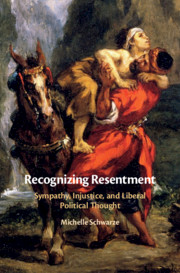3 - Sympathizing with Injustice
Hume on Resentment
Published online by Cambridge University Press: 02 October 2020
Summary
There is no eighteenth-century moral philosopher more reknown for his work on the passions than David Hume, but political theorists have only recently began to explore Hume's myriad, important contributions to the study of moral and political motivation and obligation. The study of Hume's political thought has always been plagued by a so-called “motivational dilemma” related to his theory of justice, which suprisingly appears to rationally established. I argue in this chapter instead that the affective components of Hume's theory of justice, including his treatment of sympathetic resentment, are just as central. Hume not only builds on Butler's account of sympathy but also nuances resentment's tie to injustice, as both an alert to injury and as a motive subject to partiality. Hume explains when and why we are likely to be partial in our sympathetic resentments, as well as what kind of instutions might counteract such partiality.
Information
- Type
- Chapter
- Information
- Recognizing Resentment , pp. 65 - 97Publisher: Cambridge University PressPrint publication year: 2020
